高中英语SPEED READING知识精讲
- 格式:doc
- 大小:46.00 KB
- 文档页数:5

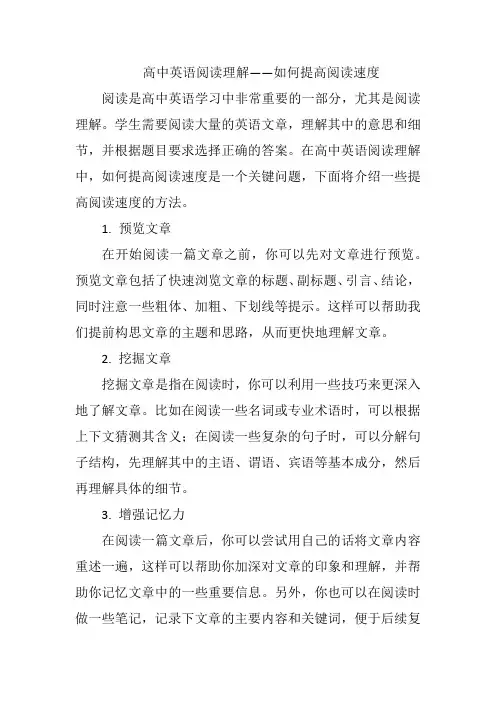
高中英语阅读理解——如何提高阅读速度阅读是高中英语学习中非常重要的一部分,尤其是阅读理解。
学生需要阅读大量的英语文章,理解其中的意思和细节,并根据题目要求选择正确的答案。
在高中英语阅读理解中,如何提高阅读速度是一个关键问题,下面将介绍一些提高阅读速度的方法。
1. 预览文章在开始阅读一篇文章之前,你可以先对文章进行预览。
预览文章包括了快速浏览文章的标题、副标题、引言、结论,同时注意一些粗体、加粗、下划线等提示。
这样可以帮助我们提前构思文章的主题和思路,从而更快地理解文章。
2. 挖掘文章挖掘文章是指在阅读时,你可以利用一些技巧来更深入地了解文章。
比如在阅读一些名词或专业术语时,可以根据上下文猜测其含义;在阅读一些复杂的句子时,可以分解句子结构,先理解其中的主语、谓语、宾语等基本成分,然后再理解具体的细节。
3. 增强记忆力在阅读一篇文章后,你可以尝试用自己的话将文章内容重述一遍,这样可以帮助你加深对文章的印象和理解,并帮助你记忆文章中的一些重要信息。
另外,你也可以在阅读时做一些笔记,记录下文章的主要内容和关键词,便于后续复习。
4. 练习速阅速阅是指在规定的时间内尽可能快地阅读一篇文章,并了解其中的主旨和细节。
可以采用计时器来控制时间,逐渐提高速阅的难度,从短篇文章到长篇文章,从简单到复杂。
这样可以锻炼你的速度和准确性,在短时间内快速掌握文章的信息。
练习题:1. 阅读下面的文章How to improve reading speedReading is an important part of learning English. If you want to improve your reading speed, you need to practice regularly. Here are some tips for improving your reading speed:1. Preview the text before you start reading.2. Scan the text quickly to find important information.3. Focus on the main ideas and ignore the details.4. Use your finger or a pen to guide your eyes along the lines.5. Practice speed-reading drills to improve your speed.2. 根据文章内容,回答下列问题:1. What is reading?2. How can you improve your reading speed?3. What are some tips for improving your reading speed?4. How can you practice speed-reading drills?参考答案:1. Reading is an important part of learning English.2. You can improve your reading speed by practicing regularly.3. Some tips for improving your reading speed include previewing the text, scanning the text quickly, focusing on the main ideas, using your finger or a pen to guide your eyes along the lines, and practicing speed-reading drills.4. You can practice speed-reading drills by starting with short texts, gradually increasing the length and difficulty of the texts, and timing yourself to see how quickly you can read the text.。

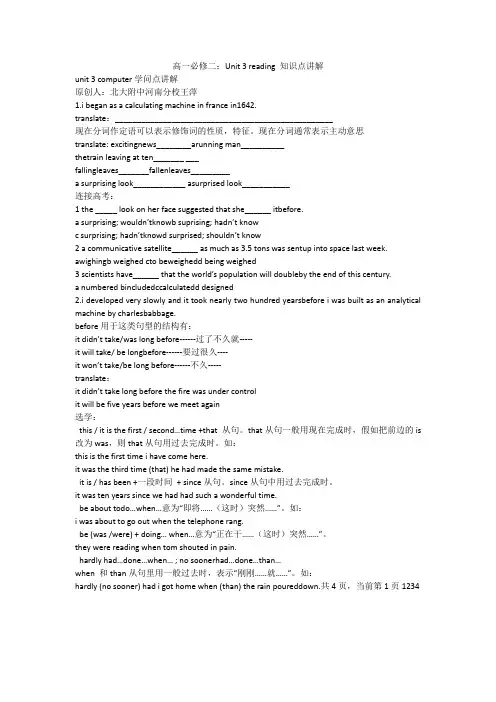
高一必修二:Unit 3 reading 知识点讲解unit 3 computer学问点讲解原创人:北大附中河南分校王萍1.i began as a calculating machine in france in1642.translate:__________________________________________________现在分词作定语可以表示修饰词的性质,特征。
现在分词通常表示主动意思translate: excitingnews________arunning man__________thetrain leaving at ten_______ ___fallingleaves_______fallenleaves_________a surprising look____________ asurprised look___________连接高考:1 the _____ look on her face suggested that she______ itbefore.a surprising; wouldn’tknowb suprising; hadn’t knowc surprising; hadn’tknowd surprised; shouldn’t know2 a communicative satellite______ as much as 3.5 tons was sentup into space last week. awighingb weighed cto beweighedd being weighed3 scientists have______ that the world’s population will doubleby the end of this century.a numbered bincludedccalculatedd designed2.i developed very slowly and it took nearly two hundred yearsbefore i was built as an analytical machine by charlesbabbage.before用于这类句型的结构有:it didn’t take/was long before------过了不久就-----it will take/ be longbefore------要过很久----it won’t take/be long before------不久-----translate:it didn’t take long before the fire was under controlit will be five years before we meet again选学:this / it is the first / second…time +that 从句。
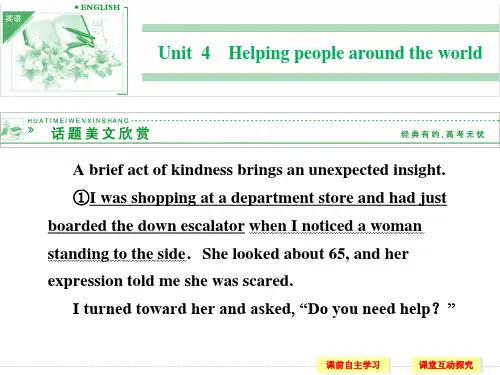
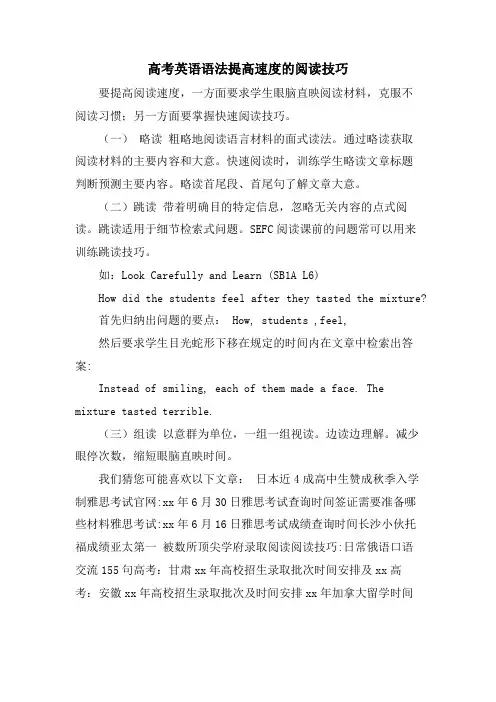
高考英语语法提高速度的阅读技巧要提高阅读速度,一方面要求学生眼脑直映阅读材料,克服不阅读习惯;另一方面要掌握快速阅读技巧。
(一)略读粗略地阅读语言材料的面式读法。
通过略读获取阅读材料的主要内容和大意。
快速阅读时,训练学生略读文章标题判断预测主要内容。
略读首尾段、首尾句了解文章大意。
(二)跳读带着明确目的特定信息,忽略无关内容的点式阅读。
跳读适用于细节检索式问题。
SEFC阅读课前的问题常可以用来训练跳读技巧。
如:Look Carefully and Learn (SB1A L6)How did the students feel after they tasted the mixture?首先归纳出问题的要点: How, students ,feel,然后要求学生目光蛇形下移在规定的时间内在文章中检索出答案:Instead of smiling, each of them made a face. The mixture tasted terrible.(三)组读以意群为单位,一组一组视读。
边读边理解。
减少眼停次数,缩短眼脑直映时间。
我们猜您可能喜欢以下文章:日本近4成高中生赞成秋季入学制雅思考试官网:xx年6月30日雅思考试查询时间签证需要准备哪些材料雅思考试:xx年6月16日雅思考试成绩查询时间长沙小伙托福成绩亚太第一被数所顶尖学府录取阅读阅读技巧:日常俄语口语交流155句高考:甘肃xx年高校招生录取批次时间安排及xx高考:安徽xx年高校招生录取批次及时间安排xx年加拿大留学时间规划确定目标选择学校喜讯!美国签证顶峰期到来学生可申请加急面谈预约高考语法:高中英语语法-抓住阅读技巧,提高阅读速度(四)记忆阅读语言材料时,熟记文中的重要事实,情节是提高阅读理解速度的重要手段。
边读边忘,便无法深入全面理解材料。
回视,重读等不良阅读习惯会随之出现。
加强记忆能力的训练可以通过背诵重点句型、段落主题句、课文主要段落、结论,也可以在规定的时间之内要求学生阅读一段文章,然后复述该段文章的主要内容。
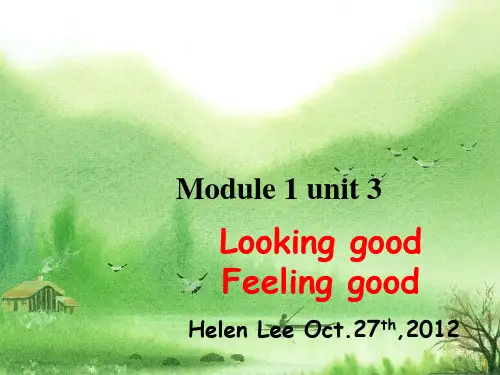

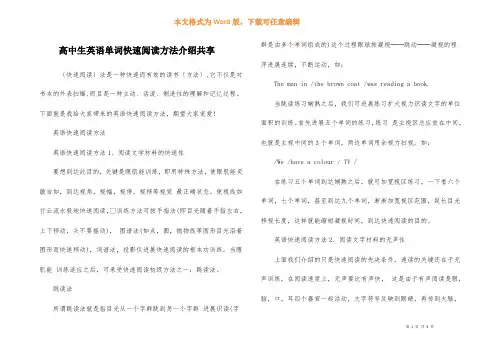
高中生英语单词快速阅读方法介绍共享〔快速阅读〕法是一种快速而有效的读书〔方法〕,它不仅是对书本的外表扫瞄,而且是一种主动、活泼、制造性的理解和记忆过程。
下面就是我给大家带来的英语快速阅读方法,期望大家宠爱!英语快速阅读方法英语快速阅读方法1、阅读文学材料的快速性要想到达此目的,关键是眼肌能训练,即用特殊方法,使眼肌能灵敏自如,到达视角,视幅,视停,视移等视觉最正确状态。
使视线如行云流水般地快速阅读,•训练方法可按手指法(即目光随着手指左右,上下移动,头不要摇动),图谱法(如点,圆,抛物线等图形目光沿着图形而快速移动),词谱法,投影仪进展快速阅读的根本功训练。
当眼肌能训练适应之后,可承受快速阅读初级方法之一:跳读法。
跳读法所谓跳读法就是指目光从一个字群跳到另一个字群进展识读(字群是由多个单词组成的)这个过程眼球按凝视──跳动──凝视的程序进展连续,不断运动,如:The man in /the brown coat /was reading a book.当跳读练习娴熟之后,我们可进展练习扩大视力识读文字的单位面积的训练。
首先进展五个单词的练习,练习是主视区总应放在中间,也就是主视中间的3个单词,两边单词用余视力扫视。
如:/We /have a colour / TV /在练习五个单词到达娴熟之后,就可加宽视区练习,一下看六个单词,七个单词,甚至到达九个单词,渐渐加宽视区范围,延长目光移视长度,这样就能缩短凝视时间,到达快速阅读的目的。
英语快速阅读方法2、阅读文字材料的无声性上面我们介绍的只是快速阅读的先决条件,速读的关键还在于无声训练,在阅读速度上,无声要比有声快,这是由于有声阅读是眼,脑,口,耳四个器官一起活动,文字符号反映到眼睛,再传到大脑,大脑指令嘴发音,耳在监听区分正确与否。
而无声阅读只是运用眼和脑两大器官,省去了口的发音和耳朵的监听,因此它的速度要快,快速阅读的信息变换方式为:书面信息-眼睛扫描信息-大脑记忆中枢的信息。
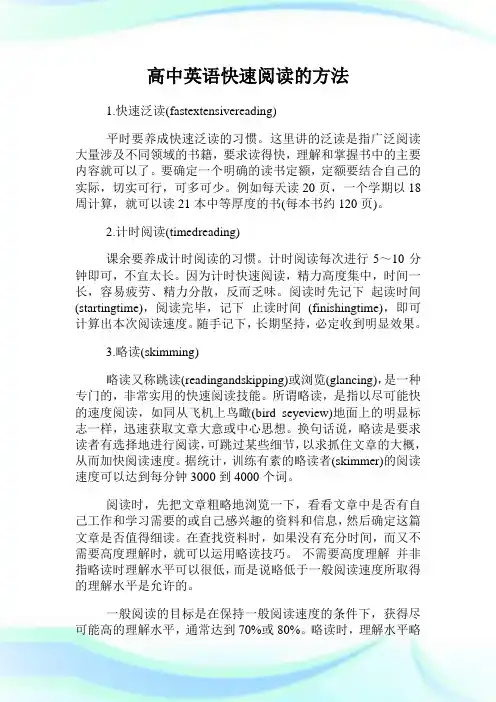
高中英语快速阅读的方法1.快速泛读(fastextensivereading)平时要养成快速泛读的习惯。
这里讲的泛读是指广泛阅读大量涉及不同领域的书籍,要求读得快,理解和掌握书中的主要内容就可以了。
要确定一个明确的读书定额,定额要结合自己的实际,切实可行,可多可少。
例如每天读20页,一个学期以18周计算,就可以读21本中等厚度的书(每本书约120页)。
2.计时阅读(timedreading)课余要养成计时阅读的习惯。
计时阅读每次进行5~10分钟即可,不宜太长。
因为计时快速阅读,精力高度集中,时间一长,容易疲劳、精力分散,反而乏味。
阅读时先记下起读时间(startingtime),阅读完毕,记下止读时间(finishingtime),即可计算出本次阅读速度。
随手记下,长期坚持,必定收到明显效果。
3.略读(skimming)略读又称跳读(readingandskipping)或浏览(glancing),是一种专门的,非常实用的快速阅读技能。
所谓略读,是指以尽可能快的速度阅读,如同从飞机上鸟瞰(bird seyeview)地面上的明显标志一样,迅速获取文章大意或中心思想。
换句话说,略读是要求读者有选择地进行阅读,可跳过某些细节,以求抓住文章的大概,从而加快阅读速度。
据统计,训练有素的略读者(skimmer)的阅读速度可以达到每分钟3000到4000个词。
阅读时,先把文章粗略地浏览一下,看看文章中是否有自己工作和学习需要的或自己感兴趣的资料和信息,然后确定这篇文章是否值得细读。
在查找资料时,如果没有充分时间,而又不需要高度理解时,就可以运用略读技巧。
不需要高度理解并非指略读时理解水平可以很低,而是说略低于一般阅读速度所取得的理解水平是允许的。
一般阅读的目标是在保持一般阅读速度的条件下,获得尽可能高的理解水平,通常达到70%或80%。
略读时,理解水平略低一些是预料之中的事,平均理解率达50%或60%就可以了。
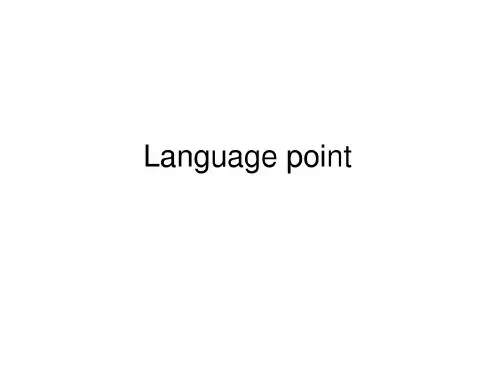
模块七第四单元Reading语言点精讲Reading—The first underground in the world1. However, most trains into London only went to the distant boundary of the city because building railway tracks into the city would have caused damage to many historic buildings. (P50) 但是大部分通往伦敦的火车只到伦敦城的远郊,因为在市区内修建铁路会损坏许多古建筑。
distantadj. far away:a distant countryShe could hear the distant sound of fireworks exploding.in the distant past/futurefar away in the past or future:At some point in the distant future I would like to have my own house.in the not-too-distant futurequite soon:They plan to have children in the not-too-distant future.distancen. [C or U]the amount of space between two places:What's the distance between Madrid and Barcelona/from Madrid to Barcelona?He travels quite a distance (= a long way) to work every day.Does she live within walking distance of her parents?historicadj. important or likely to be important in history:historic buildingsa historic day/momentIn a historic vote, the Church of England decided to allow women to become priests. historicaladj. connected with the study or representation of things from the past:Many important historical documents were destroyed when the library was bombed. She specializes in historical novels set in eighteenth-century England.historicallyadv.The film makes no attempt to be historically accurate.Historically (= Over a long period in the past), there have always been close links between France and Scotland.2. Unfortunately, the increased number of vehicles on the road choked off traffic, and the road became so busy that no one could travel anywhere. (P50) 不幸的是马路上增加的车辆把道路堵得水泄不通,交通变得如此拥挤以致于每个人都寸步难行。
高中英语挑战阅读 (一) SPEED READINGCLOZE本文为寓言故事,通过一个商人买猴子的故事,让人们更深入地了解拯救华尔街计划。
Once upon a time a man appeared in a village and announced (宣布) to the villagers that he would buy monkeys for $10 each.The villagers, seeing that there were many monkeys 1 , went out to the forest and started 2 them. The man bought all of them and, as the 3 started to diminish (减少), the villagers 4 their efforts. He next announced that he would now buy monkeys at $20 each. This let the farmers 5 their efforts once more and they started catching monkeys again. Soon the supply diminished 6 further and people started going back to their 7 .The offer 8 to $25 each and the number of monkeys became so 9 that it was hard to 10 a monkey, let alone catch it! The man now announced that he would buy monkeys at $50 each! 11 , since he had to go to the city on some business, his partner would buy them in 12 of him.During the man’s 13 , the partner told the villagers, “Look at all these monkeys in the big cage that the man has already 14 . I will 15 them to you at $35 and when the man returns from the city, you can sell them to him for 16 each.” The villagers got together all their 17 and bought all the monkeys.They 18 saw the man or his partner again, only lots of 19 !Now you have a better understanding of 20 the WALL STREET BAILOUT (救助) PLAN WILL WORK.1. A. abroad B. ahead C. aboard D. around2. A. catching B. fighting C. collecting D. killing3. A. demand B. price C. supply D. number4. A. doubled B. made C. stopped D. lessened5. A. find B. take C. get D. make6. A. even B. ever C. any D. also7. A. farms B. forests C. markets D. factories8. A. fell B. led C. increased D. added9. A. great B. common C. expensive D. small10. A. find B. raise C. sell D. buy11. A. Besides B. Therefore C. Further D. However12. A. praise B. place C. case D. need13. A. hearing B. wanting C. forgetting D. leaving14. A. collected B. caught C. stolen D. raised15. A. lend B. take C. sell D. bring16. A. $10 B. $50 C. $20 D. $2517. A. money B. children C. things D. members18. A. always B. seldom C. sometimes D. never19. A. coins B. farmers C. monkeys D. tears20. A. when B. how C. why D. whereKey: 1~5 DACCD 6~10 AACDA 11~15 DBDAC 16~20 BADCBA文章词数 270 难度★建议做题时间 7分钟Al是个不会讲英语的移民,通过勤奋学习,他的英语讲得很流利。
Speed ReadingTo improve your reading speed, you have to start trusting your brain. I promise that if you start trusting your brain more, you will have an easier time breaking your old reading habits and learning new ones. It’s about time you start trus ting your brain anyway and here’s why.Without your brain, you could not have come as far in life as you’ve come already. Every step of the way, your brain has been right alongside you. Well, it’s actually been up in your head, but when I say it’s besid e you, it sounds more like a friend.Stop and think for a moment of everything your brain has already helped you through – learning to eat and walk, your teen-aged years, your education and your jobs, your relationships, sports, driving; everything that you have ever done in your life, you have done with the help of your brain.And whether you want to believe it right now or not, your brain is fully capable of understanding all of the information it reads – the first time you read it, even if you don’t re ad that information word-for-word.How can I be so certain?Because of all of the things you already know. If you know something, doesn’t it mean that your brain knows it, too? Of course it does. Everything your brain already knows is called your background knowledge, and you have a lot ofit. Background knowledge is a compilation of every single thing you already know. And a big part of it includes all of the words currently in your vocabulary and all of your past life experiences.As you’ll learn later on when we’re developing speed reading skills, your vocabulary, which by now is far more extensive than it was when you first learned to read, is going to help you make split-second predictions about the words and word phrases that you read. And all of your previous life experiences are going to help you better understand all different types of reading materials you’ll encounter.All I want you to understand right now is that your background knowledge plays a key role in your ability to increase both your reading speed and your comprehension. If you’re still unsure about the connection, think about this. If you do a lot of traveling, you probably have an easier time understanding travel-related reading material, right? But when you read about a top ic you’re not very familiar with, like maybe your homeowner’s insurance policy, wouldn’t you agree reading becomes more difficult, even slower? Sure you would.But what you may not realize is that whenever you read unfamiliar material, there is almost always something in your background knowledge that you can draw upon to help you become more familiar with an unfamiliar topic.For example, if you’ve lived in a home before, you can call upon that experience that’s maintained inside your brain to help you understand all of the different things inside and outside your home that are and are not covered in your insurance policy. When you learn how to use your brain in this way, you will have learned a very effective way of broadening your knowledge base.Now let me finish off by pointing out something else I’ve learned from all of the years I’ve taught speed reading:The people with the most background knowledge are typically the people who have the most success with improving their reading speed.If you recall, I began this post discussing the importance of knowledge. Back then I told you that knowledge is power and that knowledge attracts others and helps you reach your goals.I also said that having knowledge means being able to comprehend what you read, retain it, and recall it when you need it. I told you then that learning to speed read will help you gain more knowledge because you’ll be able to read more with better comprehension. And as a result, reading will become more enjoyable. Now I’m telling you that having more knowledge will facilitate increased reading speed. So what does all this mean? It means that the more you read, the more you know, and the more you know, the faster you read. And the faster you read, the faster you gain more knowledge. And the more knowledge you gain the more power youhave. Beautiful, isn’t it?Here’s one final thought.Every single day you have an opportunity to broaden your knowledge simply by living and being inquisitive, but mostly by reading. Whether you read at the library or online, or you pick up a book that’s been sitting on your bookshelf for as long as you remember doesn’t matter.All you have to do is find something you’re not familiar with, read it, and when you’re finished, you will know more than you did before you started reading.And that is how you build more knowledge.By learning how to increase your reading speed and learning to read with better comprehension, you will be able to read more than you ever could before. As a result, you will also build knowledge faster than you ever could before and faster than people who don’t speed read!And that’s going to give you the competitive edge you need to succeed in today’s increasingly competitive world.Now that’s some powerful stuff, isn’t it!。
高中英语选择性必修 UNIT 泛读技能初养成课件-V1本文将针对“高中英语选择性必修 UNIT 泛读技能初养成课件”进行重新整理,帮助读者更好地理解和掌握泛读技能。
一、泛读技能概述泛读技能,即泛泛地读一遍,强调的是整体理解和抓住主旨。
在阅读理解中,泛读是非常重要的基本技能。
通过泛读,我们可以先了解整篇文章的大意,明确文章的目的、主题和段落结构,为后续的细读和分析打下基础。
二、泛读的步骤及方法1. 阅读题目和主题句先浏览文章的标题、副标题和主题句,这可以帮助我们了解文章的主题和重点,从而更好地进行泛读。
2. 浏览文章全文在阅读全文时,应该快速扫描每一个段落,了解文章的组织结构和篇章脉络。
在此过程中,可以先忽略生词,不必过分纠结于某些细节,重点抓住文章的核心内容和主旨。
3. 抓住关键词通过扫读,我们可以尽量快速找出文章的关键词,然后建立起这些关键词之间的联系,形成逻辑思维的框架。
4. 确定文章类型和阅读目的根据文章的类型和阅读目的,我们可以更好地理解文章传递的信息和意义,这也是泛读的重要目的之一。
三、泛读技能的重要性泛读是阅读理解的基础,只有掌握了泛读技能,才能更好地进行深入的细读和理解。
泛读可以帮助我们把握文章整体,明确文章的主旨和结构,同时也能从中获取一些关键信息和思路,为更深入的阅读与学习提供基础。
四、泛读技能的练习方法1. 多读文章只有通过大量的实践,才能更好地掌握泛读技能。
我们可以多读一些短文或新闻报道,每天至少读一篇。
2. 练习扫读我们可以尝试在较短的时间内,快速扫描一段文字,并抓住文章的核心内容。
3. 练习找关键词在进行泛读时,关键词的识别非常重要。
我们可以通过练习,提高识别关键词的能力。
五、结语泛读技能不仅是英语考试中的重要技能,也是我们日常生活中沟通交流的必备技能。
通过本文的讲解和练习,相信大家可以更好地掌握泛读技能,从而有更好的语言表达和交流能力。
烧烛州烟递市涛浙学校高中英语SPEED READING阅读理解A文章难度:★★词数:280 建议做题用时:8分钟What makes people happier: money or having happy friends and neighbors? Researchers from Harvard University and the University of California, San Diego, have found an answer as part of a study.The new study found that friends of happy people had a greater chance of being happy themselves. And the smaller the physical distance between friends, the larger the effect they had on each other s happiness. For example, a person was twenty percent more likely to feel happy if a friend living within one and a half kilometers was also happy. Having a happy neighbor who lived next door increased an individual’s chance of being happy by thirty-four percent. The effects of friends happiness lasted for up to a year.The researchers found that happiness really is contagious. Sadness also spread among friends, but not as much as happiness. People removed by as much as three degrees of separation still had an effect on a person’s happiness. Three degrees of separation means the friend of a friend of a friend. The study showed that having an extra five thousand dollars increased a person’s chances of becoming happier by about two percent. But the researchers found that the influence of a friend of a friend of a friend can be greater than that.Another finding is that people who are married or work together do not have as much of an effect on happiness as friends do. Earlier studies, by the two researchers described the effects of social networks on obesity and efforts to stop smoking. The new study shows that happiness spreads through social networks like an emotional virus — a virus people would be happy to catch.1. Who would be happiest, according to the passage?A. A person who is married.B. A person who works together with others.C. A person who has a happy friend.D. A person who has enough money to spend.2. A person would feel happy .A. no matter how far away his good friend livesB. if his or her friend living within a short distance is happyC. only if his or her friend lives within one and a half kilometersD. if he and his friends can get in touch easily3. If you are the friend of a friend of a happy friend, you’d .A. be quite likely to be happy tooB. have less chance of being happyC. be influenced by your friends in many waysD. have a feeling of being separated4. We can conclude from the passage that .A. happiness has nothing to do with how much money you haveB. your neighbors can also contribute to your happinessC. the distance between two friends has nothing to do with happinessD. the effects of friends’ happiness last a lifetime5. The underlined word “contagious” in the third paragraph probably means .A. that can be passed from person to personB. that has been widely acceptedC. that is hard to explainD. that can be gained through effortsB文章难度:★★★词数:305 建议做题用时:9分钟Home-schooling has been a part of American heritage since the days of the country’s founding. The first immigrants, as well as the pioneers who moved westward in later years, home-schooled their children until they were able to establish community schools. Fourteen of the forty-three United States presidents were home-schooled, including George Washington, Abraham Lincoln, Theodore Roosevelt, and Woodrow Wilson. Inventors Thomas Edison and Alexander Graham Bell were all home-schooled for at least part of their educational careers.In the early days of modern home education, state laws were highly restrictive or even prohibited parents from teaching their children at home. However, as the number of home-schooling families grew, the idea of educating at home became more popular. Eventually, all fifty statespassed laws allowing parents to teach their own children. Many states relaxed their restrictive requirements to allow more freedom and flexibility for home educators, especially as statistics began to reveal the academic success of home-schooled children.Today, parents teach at home for a variety of reasons. While desiring to educate according to the family’s religious belief system is still the number one motivation, the ability to tailor-fit(量身定制的) education to their children’s particular learning styles and unique interests is attractive to many parents. Some feel that the individual attention their students receive at home will help them to learn more successfully. Concern about school violence, negative peer pressure, and drug and alcohol use is another reason why some choose home-schooling.Because children who have been home educated consistently integrate(融合) well into schools of higher learning, most colleges welcome home-school graduates. Awareness of the positive results of home-schooling has also grown in the business community, and many employers are eager to hire those who have been educated at home. Home-school graduates have developed a reputation for integrity, taking initiative, and carrying responsibility well in the workplace.1. We can learn from the first paragraph that .A. home education was brought to America from other parts of the worldB. home education was the only form of education when the US was first foundedC. home education was highly restrictive when the US was first foundedD. the American people have a long tradition of home education2. Thomas Edison and Alexander Graham Bell .A. were home-schooled for some timeB. had little formal education when youngC. received their education mainly through home- schoolingD. were both born in poor families3. The third paragraph mainly tells us .A. the academic success of home-schooled childrenB. the reason why parents home-school their childrenC. the kinds of parents who home-school their childrenD. parents’ concern about school education4. What is the most important reason why parents home-school their children?A. To give their children a formal education.B. To suit their children’s particular learning styles and unique interests.C. To make their children better prepared for later education.D. To pass on the family’s religious belief.5. According to the last paragraph, children who have been home-educated .A. have more advantages than disadvantagesB. are popular both at school and at workC. have a poor ability to fit in with societyD. still cause some concern in modern society完形填空It started last spring when my daughter signed on to the Internet.She found it very interesting and kept asking me to try it. At age 50, I was _1__ I wouldn’t be able to learn what I would need to know. Finally, after some 2 , I agreed. I have to admit that it was very 3 and I found so many interesting things.Then one day, I 4 in the word “adoption” on a search engine. I couldn’t believe all the stuff that 5 . I became obsessed(痴迷的). You see, I had a baby boy many years ago and I gave him away to 6 , but I never stopped thinking about him and 7 for his well-being. I had been 8 since 1985 for my birth son to contact(联系) me. By February 1999 I had been searching the 9 for 10 months, contacting the Youth Services and not receiving one shred of 10 .I was told there was nothing I could do. I was ready to give up.The following week, I read a 11 written on the Internet by a birth mom and I was given one last thing to do before I 12 . She had a baby girl at St. Vinc ent’s in Philadelphia, Pennsylvania, and a social worker from CSS had 13 her with her daughter. Something inside me told me to 14 to this woman and ask her about her reunion with her daughter. She wrote and told me to 15 a number in Philadelphia and ask a social worker if they could 16 . Six weeks later I 17 my son, Joseph, for the second time in 32 years.I was the beneficiary of a miracle(奇迹). I could write so much more about the 18 , but they are not of 19 . What is important is the fact that we should 20 stop believing in miracles.1. A. sorry B. afraid C. ashamed D. curious2. A. experiment B. disappointment C. encouragement D. improvement3. A. enjoyable B. complex C. difficult D. quick4. A. inserted B. placed C. pressed D. typed5. A. came up B. came out C. came in D. came over6. A. nursery B. society C. charity D. adoption7. A. looking B. asking C. praying D. caring8. A. sensing B. waiting C. expecting D. begging9. A. Internet B. neighborhood C. city D. media10. A. support B. theme C. proof D. hope11. A. notice B. post C. letter D. story12. A. failed B. attempted C. quit D. succeeded13. A. reunited B. connected C. identified D. related14. A. speak B. point C. turn D. write15. A. find B. call C. pick D. get16. A. help B. manage C. answer D. join17. A. recognized B. caught C. met D. reached18. A. effects B. results C. processes D. details19. A. importance B. use C. value D. benefit20. A. always B. never C. still D. also刘景田朱利平参考答案:阅读理解A篇本文是科普阅读。
高中英语SPEED READING阅读理解A文章难度:★★词数:280 建议做题用时:8分钟What makes people happier: money or having happy friends and neighbors? Researchers from Harvard University and the University of California, San Diego, have found an answer as part of a study.The new study found that friends of happy people had a greater chance of being happy themselves. And the smaller the physical distance between friends, the larger the effect they had on each other s happiness. For example, a person was twenty percent more likely to feel happy if a friend living within one and a half kilometers was also happy. Having a happy neighbor who lived next door increased an individual’s chance of being happy by thirty-four percent. The effects of friends happiness lasted for up to a year.The researchers found that happiness really is contagious. Sadness also spread among friends, but not as much as happiness. People removed by as much as three degrees of separation still had an effect on a person’s happiness. Three degrees of separatio n means the friend of a friend of a friend. The study showed that having an extra five thousand dollars increased a person’s chances of becoming happier by about two percent. But the researchers found that the influence of a friend of a friend of a friend can be greater than that.Another finding is that people who are married or work together do not have as much of an effect on happiness as friends do. Earlier studies, by the two researchers described the effects of social networks on obesity and efforts to stop smoking. The new study shows that happiness spreads through social networks like an emotional virus —a virus people would be happy to catch.1. Who would be happiest, according to the passage?A. A person who is married.B. A person who works together with others.C. A person who has a happy friend.D. A person who has enough money to spend.2. A person would feel happy .A. no matter how far away his good friend livesB. if his or her friend living within a short distance is happyC. only if his or her friend lives within one and a half kilometersD. if he and his friends can get in touch easily3. If you are the friend of a friend of a happy friend, you’d.A. be quite likely to be happy tooB. have less chance of being happyC. be influenced by your friends in many waysD. have a feeling of being separated4. We can conclude from the passage that .A. happiness has nothing to do with how much money you haveB. your neighbors can also contribute to your happinessC. the distance between two friends has nothing to do with happinessD. the effects of friends’ happiness last a lifetime5. The underlined word “contagious” in the third paragraph probably means.A. that can be passed from person to personB. that has been widely acceptedC. that is hard to explainD. that can be gained through effortsB文章难度:★★★词数:305 建议做题用时:9分钟Home-schooling has been a part of American heritage since the days of the country’s founding. The first immigrants, as well as the pioneers who moved westward in later years, home-schooled their children until they were able to establish community schools. Fourteen of the forty-three United States presidents were home-schooled, including George Washington, Abraham Lincoln, Theodore Roosevelt, and Woodrow Wilson. Inventors Thomas Edison and Alexander Graham Bell were all home-schooled for at least part of their educational careers.In the early days of modern home education, state laws were highly restrictive or even prohibited parents from teaching their children at home. However, as the number of home-schooling families grew, the idea of educating at home became more popular. Eventually, all fifty states passed laws allowing parents to teach their own children. Many states relaxed their restrictive requirements to allow more freedom and flexibility for home educators, especially as statistics began to reveal the academic success of home-schooled children.Today, parents teach at home for a variety of reasons. While desiring to educate according to the family’s religious belief system is still the number one motivation, the ability to tailor-fit(量身定制的) education to their children’s particular learning styles and unique interests is attractive to many parents. Some feel that the individual attention their students receive at home will help them to learn more successfully. Concern about school violence, negative peer pressure, and drug and alcohol use is another reason why some choose home-schooling.Because children who have been home educated consistently integrate(融合) well into schools of higher learning, most colleges welcome home-school graduates. Awareness of the positive results of home-schooling has also grown in the business community, and many employers are eager to hire those who have been educated at home. Home-school graduates have developed a reputation for integrity, taking initiative, and carrying responsibility well in the workplace.1. We can learn from the first paragraph that .A. home education was brought to America from other parts of the worldB. home education was the only form of education when the US was first foundedC. home education was highly restrictive when the US was first foundedD. the American people have a long tradition of home education2. Thomas Edison and Alexander Graham Bell .A. were home-schooled for some timeB. had little formal education when youngC. received their education mainly through home- schoolingD. were both born in poor families3. The third paragraph mainly tells us .A. the academic success of home-schooled childrenB. the reason why parents home-school their childrenC. the kinds of parents who home-school their childrenD. parents’ concern about school education4. What is the most important reason why parents home-school their children?A. To give their children a formal education.B. To suit their children’s particular learning styles and unique interests.C. To make their children better prepared for later education.D. To pass on the family’s religious belief.5. According to the last paragraph, children who have been home-educated .A. have more advantages than disadvantagesB. are popular both at school and at workC. have a poor ability to fit in with societyD. still cause some concern in modern society完形填空It started last spring when my daughter signed on to the Internet.She found it very interesting and kept asking me to try it. At age 50, I was _1__ I wouldn’t be able to learn what I would need to know. Finally, after some 2 , I agreed. I have to admit that it was very 3 and I found so many interesting things.Then one day, I 4 in the word “adoption” on a search engine. I couldn’t believe all the stuff that 5 . I became obsessed(痴迷的). You see, I had a baby boy many years ago and I gave him away to 6 , but I never stopped thinking about him and 7 for his well-being. I had been8 since 1985 for my birth son to contact(联系) me. By February 1999 I had been searching the9 for 10 months, contacting the Youth Services and not receiving one shred of 10 . I was told there was nothing I could do. I was ready to give up.The following week, I read a 11 written on the Internet by a birth mom and I was given one last thing to do before I 12 . She had a baby girl at St. Vincent’s in Philadel phia, Pennsylvania, and a social worker from CSS had 13 her with her daughter. Something inside me told me to 14 to this woman and ask her about her reunion with her daughter. She wrote and told me to 15 a number in Philadelphia and ask a social worker if they could 16 . Six weeks later I 17 my son, Joseph, for the second time in 32 years.I was the beneficiary of a miracle(奇迹). I could write so much more about the 18 , but they are not of 19 . What is important is the fact that we should 20 stop believing in miracles.1. A. sorry B. afraid C. ashamed D. curious2. A. experiment B. disappointment C. encouragement D. improvement3. A. enjoyable B. complex C. difficult D. quick4. A. inserted B. placed C. pressed D. typed5. A. came up B. came out C. came in D. came over6. A. nursery B. society C. charity D. adoption7. A. looking B. asking C. praying D. caring8. A. sensing B. waiting C. expecting D. begging9. A. Internet B. neighborhood C. city D. media10. A. support B. theme C. proof D. hope11. A. notice B. post C. letter D. story12. A. failed B. attempted C. quit D. succeeded13. A. reunited B. connected C. identified D. related14. A. speak B. point C. turn D. write15. A. find B. call C. pick D. get16. A. help B. manage C. answer D. join17. A. recognized B. caught C. met D. reached18. A. effects B. results C. processes D. details19. A. importance B. use C. value D. benefit20. A. always B. never C. still D. also刘景田朱利平参考答案:阅读理解A篇本文是科普阅读。